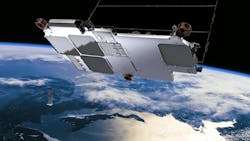Air Force to capitalize on growing commercial satellite communications infrastructure for tactical internet
THE MIL & AERO COMMENTARY – The U.S. Air Force is drawing from a deepening well of commercially available satellite communications (SATCOM) technology to enhance military internet tactical networking for warfighters on the ground, in the air, and at sea.
The idea is to capitalize on commercial communications satellite constellations under development to reduce military SATCOM costs, as well as enhance reliability and data throughput.
One of the core projects in this area is the Defense Experimentation Using the Commercial Space Internet (DEUCSI) program, which seeks the ability to move and share data seamlessly among a wide variety of fixed and mobile operating locations using constantly available, high-bandwidth, beyond-line-of-sight communications.
This new capability will be called path-agnostic communications because it aims to enable military users to communicate reliably to any location in the world without explicitly specifying which nodes of a communication network to use.
Making the vision for path-agnostic communications possible is the growing commercial space internet, based on commercial satellites. Several commercial companies plan to establish space internet constellations consisting of hundreds to thousands of satellites, each to create global internet services.
Related: How military harvests technology from commercial industry
The DEUCSI program seeks to establish resilient, high-bandwidth, high-availability Air Force communications and data sharing by capitalizing on these kinds of developing commercial space internet networks.
This approach differs radically from traditional military satellite communications programs in which the government typically specifies and funds every aspect of the program. Instead, taking advantage of the commercial space internet will concentrate military efforts on a few areas that are unique to Air Force applications.
The project has three phases: establish connectivity between several Air Force sites using commercial demonstration satellites and terminals; expand connectivity to many Air Force assets by proliferating user terminals to several locations and vehicle types; and special experiments to address military-unique requirements not otherwise met by commercial space internet vendors.
Thus far several U.S. space companies are involved in the project. DEUCSI last fall tested SpaceX Starlink satellite broadband services and demonstrated download speeds of 610 megabits per second into the cockpit of a C-12J Huron twin-engine turboprop aircraft.
SpaceX received a $28 million contract last year to assess Starlink by connecting the network to military platforms. The project also is testing the Iridium Certus service under a $2.5 million contract.
Last year DEUCSI contracts went to Iridium Satellite LLC in McLean, Va., and to the L3Harris Communication Systems West segment in Salt Lake City. Iridium won a $2.5 million contract in July 2018, and L3Harris Communication Systems West won a $5.7 million contract in September 2018.
L3Harris is testing military ground terminals and will make minor modifications so they are compatible with the several commercial SATCOM services.
Last October the Air Force awarded DEUCSI contracts to Lockheed Martin Corp. in Bethesda, Md., and to Ball Aerospace & Technologies Corp. in Boulder, Colo. Lockheed Martin got a $3.5 million contract, and Ball Aerospace won a $2.3 million contract to test a phased array on a ground vehicle so that one terminal could communicate with communications satellites in several different orbits.
More recently, Air Force researchers awarded a $17.9 million contract to L3Harris Technologies Communication Systems-West; and a $9.9 million contract to the Northrop Grumman Technology Services segment in Herndon, Va., for the DEUCSI Call 002 vendor flexibility effort.
The contracts to L3Harris and Northrop Grumman seek to establish the ability to communicate with Air Force and other military platforms via several different commercial space internet constellations using common user terminal hardware elements.
Air Force technicians have installed a SATCOM terminal on an AC-130 special operations gunship aircraft to test commercial SATCOM capabilities.
For the future, the Air Force will test an commercial SATCOM terminal aboard a KC-135 aerial refueling tanker next spring. In addition, Air Force contractors will modify terminals for military SATCOM.
About the Author
John Keller
Editor-in-Chief
John Keller is the Editor-in-Chief, Military & Aerospace Electronics Magazine--provides extensive coverage and analysis of enabling electronics and optoelectronic technologies in military, space and commercial aviation applications. John has been a member of the Military & Aerospace Electronics staff since 1989 and chief editor since 1995.
